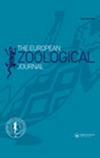Protease activity in the egg yolk during the development of Meleagris gallopavo (Galliformes: Phasianidae) embryos
引用次数: 4
Abstract
Abstract The egg white and egg yolk are the two main sources of nutrients for the developing avian embryo. Egg white ultimately reaches egg yolk before being consumed by the embryo. Previously, in the turkey Meleagris gallopavo, we showed that the major egg white transfer into the yolk through the amnion and intestinal lumen of the embryo started on day 17 and became obvious on day 19. We also suggested that the transferred egg white and endogenous yolk proteins undergo digestion at late developmental stages. However, the protease activity throughout development and the type of activated proteases are completely unexplored in the yolk of turkey eggs. Here, we measured the general proteolytic activity in the egg yolk during different developmental stages using casein as a substrate. Furthermore, we determined the type of activated proteases by employing different types of protease inhibitors. Protease activity in the egg yolk was basal throughout development until day 19 when activity significantly increased, remaining high thereafter. Moreover, acidic aspartic protease(s) were primarily activated in the yolk. Our results suggest that the transferred egg white and endogenous yolk proteins are mostly degraded by the aspartic proteases that become highly activated late in development.肉苁蓉胚胎发育过程中蛋黄蛋白酶活性的研究
蛋清和蛋黄是禽类胚胎发育的两大主要营养来源。蛋白在被胚胎消耗之前最终到达蛋黄。先前,我们在火鸡Meleagris gallopavo中发现,主要的蛋清通过胚胎的羊膜和肠腔转移到蛋黄中,开始于第17天,并在第19天变得明显。我们还认为,转移的蛋清和内源蛋黄蛋白在发育后期进行消化。然而,在火鸡蛋的蛋黄中,蛋白酶在整个发育过程中的活性和被激活的蛋白酶的类型是完全未知的。在这里,我们用酪蛋白作为底物,测量了蛋黄在不同发育阶段的一般蛋白水解活性。此外,我们通过使用不同类型的蛋白酶抑制剂来确定活化蛋白酶的类型。蛋黄蛋白酶活性在整个发育过程中处于基础状态,直到第19天活性显著升高,此后一直保持较高水平。此外,酸性天冬氨酸蛋白酶主要在蛋黄中被激活。我们的研究结果表明,转移的蛋清和内源性蛋黄蛋白主要被天冬氨酸蛋白酶降解,这些蛋白酶在发育后期变得高度激活。
本文章由计算机程序翻译,如有差异,请以英文原文为准。
求助全文
约1分钟内获得全文
求助全文

 求助内容:
求助内容: 应助结果提醒方式:
应助结果提醒方式:


